Analysis
Latest Greek debt deal leaves an open question of privatization
Greece got a green light for €10.3 billion, but critics on the left say it could come at the cost of privatized infrastructure.

In the end, Greece and Europe reached an agreement, although with a list of provisions. Based on what was decided during the Eurogroup’s meeting, which ended at 2 a.m. Wednesday, a green light has been given for the €10.3 billion tranche, which will be paid in two installments: €7.5 billion in June and €2.8 billion in September. With the cash from the first installment, Athens will be able to pay the debts due to the European Central Bank and the International Monetary Fund. For the first evaluations, the Greek state will be able to use about €3.5 billion to pay a small part of what was owed to private parties, after a probable negotiation which will bring, for now, to the payment of about half of the sums discussed.
Then there’s the issue of public debt: This long-standing issue, considered by the Alexis Tsipras government as vitally important, has been discussed for the first time concretely. For what’s related to the near-term, it has been agreed that the country’s financial needs will not exceed 15 percent of GDP, and 20 percent on the long-term. The main package of measures aimed at easing Athens’ debt will be applied starting in 2018, provided that the Greek government will apply all that has been provided in the program aimed at supporting the country.
According to what has been revealed by sources within the Greek government, the European partners have taken the obligation to examine the undertaking of the loans made by the IMF to Athens before their natural expiration using the roughly €20 billion that has not appeared as being necessary to recapitalize the Greek banks. According to the same sources, Greece might gradually return onto the markets starting with the second half of 2017, with full access at the beginning of 2018. Even for what’s related to the primary surplus, it remains set at 3.5 percent of GDP for 2018, but for the future it’s open to a possible decrease in order to allow the economy to breathe and to favor investment.
Obviously, until then, there will be a series of new evaluations by the creditors, in relation to Athens’ progress since applying the program signed last July. The new meeting and examination is set for October.
From a technical point of view, the agreement allows the International Monetary Fund to continue the program aimed at assisting Greece, although before the end of the year the IMF will need to verify compliance to all the terms in order to make the country’s public debt sustainable, including in the long-term. From the political and social point of view, all the commentaries underline that fact that, first of all, the existence of the conditions for a substantial relapse that can be perceived in the real economy has to be verified. The public wants to understand whether unemployment, which is stuck to the more than worrying proportion of 24.4 percent, will start decreasing in an evident manner.
“We are starting to move out of the vicious circle of recession, with new measures creating additional recession, with a clear path that will bring new investors to Greece,” Finance Minister Efklidis Tsakalotos said.
Nonetheless, it will be necessary to see how much of the public assets, starting from local transportation infrastructure, the Greek postal services and the electrical grid, will end up in private hands. The great majority of Syriza voters do not want the state to disappear, leaving the services in the hands of the big international economic and financial groups. Tsipras will need to be successful in not disappointing them.
It’s clear that the agreement reached in Brussels allows everybody some time, but after six years of recession and neoliberal policy, the country also urgently needs to be able to pull out. From the left, both Zoe Konstantinopoulou, former Speaker of the Parliament, now leader of the Route Toward Freedom group, and Panajòtis Lafazànis, the former minister and leader of Popular Unity, have rejected the agreement. They called it a “sale of the state’s properties” and “implementation of the strategy of loans and debt overexposure of the past.”
The Syriza government spokeswoman Olga Gerovasili responded that this is the first time that the parties have reached an effective road map for unloading debt and that it represents a stable basis to allow the country’s economy to return to growth.
In all of this, it will be necessary to verify whether a decrease of the fiscal pressure will also be possible, seeing that, between income taxes and home taxes, the Greek people’s pockets have been left empty. And, from July 1, the VAT increase the creditors want along with a 24 percent main tax rate and the end of the reductions applied, until now, in 11 islands in the Aegean Sea will take place.
Originally published at http://ilmanifesto.info/grecia-finalmente-laccordo-e-subito-le-condizioni/ on 2016-05-26
